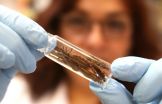(Press-News.org) A deadly parasite that causes Chagas disease is widespread in a common Texas insect, according to a new study by University of Texas at El Paso (UTEP) researchers. The finding suggests that the risk of Texans contracting the disease may be higher than previously thought.
The parasite Trypanosoma cruzi (T. cruzi), which causes Chagas disease can be transmitted to humans by blood-sucking insects known as "assassin bugs" or "kissing bugs." Unlike mosquitoes that transmit malaria through the bite, kissing bugs drop feces on the subject while filling up with blood. The feces, which are contaminated with the parasite, often lands in the bite wound. From there, it penetrates the bloodstream and affects the heart and gastrointestinal system.
Curious to know the prevalence of T. cruzi in west Texas insects, UTEP biologists set traps to collect the bugs at the University's Indio Mountains Research Station. The station sits about 100 miles north of the U.S.-Mexico border in Hudspeth County, Texas.
In all, the researchers trapped 39 kissing bugs (Triatoma rubida) and tests revealed that 24 bugs-- or 61 percent -- were infected with T. cruzi. The findings were published in the journal Acta Tropica.
"It surprised me that so many of them were carrying the parasite," says Rosa A. Maldonado, D.Sc., an associate professor of biological sciences at UTEP who led the study. "I was expecting to have some, but this is quite high."
Maldonado adds that there's a high rate of heart disease along the border and one of the causes could be Chagas disease.
Thirty percent of people infected with the parasite develop life-threatening symptoms like heart rhythm abnormalities and difficult eating or passing stool. The disease can also lead to an enlarged esophagus, colon and heart, and even, heart failure.
"Doctors usually don't consider Chagas disease when they diagnose patients, so they need to be aware of its prevalence here," says Maldonado. To prevent parasite transmission by the kissing bug, the biologist says it's important to be aware of the presence of the bugs in the house and yard because pets like dogs and cats are also vulnerable.
But getting bitten by a kissing bug isn't the only way to contract the disease. Once a human is infected, the parasite can be transmitted to others via organ transplants, blood transfusions and from a mother to a fetus. In addition, the parasite can be spread through foods and juices tainted by the contaminated bug feces.
Maldonado hopes her work brings more awareness to the often overlooked disease, which she calls an emerging infectious disease in the U.S. The biologist is currently investigating the prevalence of T. cruzi in kissing bugs, street dogs and cats found in El Paso, Texas, an urban city on the U.S.-Mexico border with more than 675,000 residents.
INFORMATION:
Link to the paper: http://dx.doi.org/10.1016/j.actatropica.2015.07.004
A low resting heart rate in late adolescence was associated with increased risk for violent criminality in men later in life, according to an article published online by JAMA Psychiatry.
Low resting heart rate is related to antisocial behavior in children and adolescents. Low resting heart rate (RHR) has been viewed either as an indicator of a chronically low level of psychological arousal, which may lead some people to seek stimulating experiences, or as a marker of weakened responses to aversive and stressful stimuli, which can lead to fearless behavior and risk taking. ...
Among patients 70 years or older who underwent elective surgery, major complications contributed significantly to a prolonged length of hospital stay while delirium contributed significantly to several adverse outcomes, including length of stay and hospital readmission, according to a study published online by JAMA Surgery.
Major postoperative complications and delirium contribute independently to adverse outcomes and high resource use in patients who undergo major surgery; however, their interrelationship has not been well examined. Understanding the risks of adverse ...
A follow-up of nearly 60,000 women who received a synthetic vaginal mesh sling for the treatment of stress urinary incontinence finds the risk is low for needing a second surgery for mesh removal or revision (about 1 in 30 women ten years after surgery), according to a study published online by JAMA Surgery.
Female stress urinary incontinence (SUI) is a common condition that is often treated with surgery when conservative management options are unsuccessful. An estimated 1 in 7 women will undergo surgery for SUI during their lifetime. Synthetic mesh slings are the most ...
BOSTON -- Researchers from the Aging Brain Center at the Institute for Aging Research (IFAR) at Hebrew SeniorLife confirm that delirium is a significant and independent contributing factor to poor postsurgical outcomes in older adults. Findings published in JAMA Surgery suggest that the combination of major postoperative complications and delirium demonstrate a strong combined effect on adverse outcomes in older adults undergoing major surgery.
Of all inpatient operations in the U.S. in 2007, 36% were performed on patients 65 years of age or older, and that number is ...
Capsaicin, the compound responsible for chilis' heat, is used in creams sold to relieve pain, and recent research shows that in high doses, it kills prostate cancer cells. Now researchers are finding clues that help explain how the substance works. Their conclusions suggest that one day it could come in a new, therapeutic form. Their study appears in ACS' The Journal of Physical Chemistry B.
About 10 years ago, researchers reported that capsaicin can kill prostate cancer cells in mice while leaving healthy cells unharmed. But translating that dose to humans would require ...
An isolated, iron-rich bay in the heart of East Africa is offering scientists a rare glimpse back into Earth's primitive marine environment, and supports theories that tiny microbes created some of the world's largest ore deposits billions of years ago.
According to University of British Columbia (UBC) research published this week in Scientific Reports, 30 per cent of the microbes in the Democratic Republic of the Congo's Kabuno Bay grow by a type of photosynthesis that oxidizes (rusts) iron rather than converting water into oxygen like plants and algae.
"Kabuno Bay ...
Smoking has been shown to have drastic consequences for lifespan and disease progression, and it has been suggested that cigarette exposure may impact the risk of death and disease via its acceleration of the aging process. Not all smokers experience early mortality, however, and a small proportion manage to survive to extreme ages.
Using long-lived smokers as their phenotype, the authors of a study published today in The Journals of Gerontology, Series A: Biological Sciences & Medical Sciences identified a network of SNPs (a DNA sequence variation occurring commonly ...
WASHINGTON - The percentage of poor children who received federal disability benefits for at least one of 10 major mental disorders increased from 1.88 percent in 2004 to 2.09 percent in 2013, and such growth is consistent with and proportionate to trends in the prevalence of diagnosed mental disorders among children in the general U.S. population, says a new report of the National Academies of Sciences, Engineering, and Medicine. The increase also is not unexpected. This is because a sizeable number of low-income children with disabling mental disorders do not receive ...
BOSTON -- Racial and ethnic inequalities in medical care are widely documented in literature. However, variations in Americans' experiences with healthcare, specifically regarding physician-patient communication and shared decision-making about treatment plans, are not well understood. A new study from Boston Medical Center, which suggests that a patient's race/ethnicity may influence the amount and type of information they receive from physicians regarding treatment recommendations, is published online in advance of print in the journal Patient Education and Counseling.
"It's ...
Scientists have developed a new hybrid, solar-energy system that harnesses the full spectrum of the sun's radiation by pairing a photovoltaic cell with polymer films. The films convert the light that goes unused by the solar cell into heat and then converts the heat into electricity. They report on their device, which produces a voltage more than five times higher than other hybrid systems, in the journal ACS Nano.
Solar cells today are getting better at converting sunlight to electricity, but commercial panels still harvest only part of the radiation they're exposed ...


